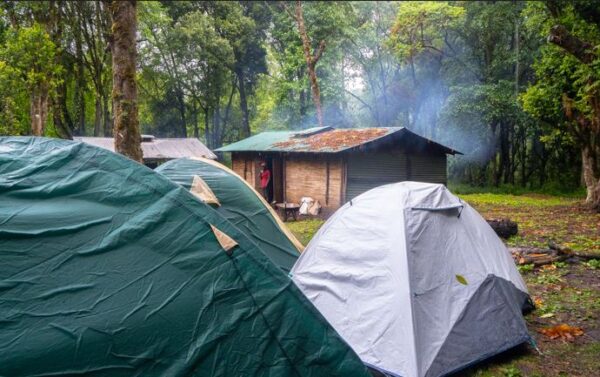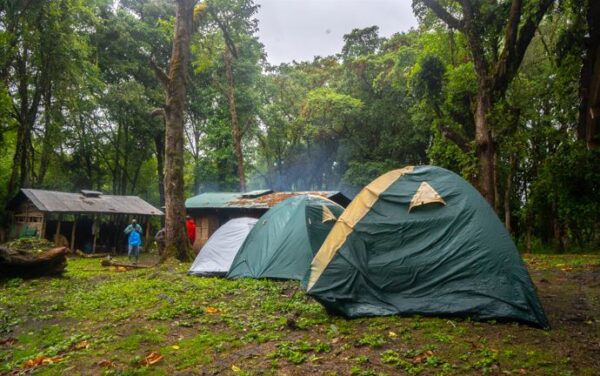Camping in Uganda
Whether you are travelling Uganda on a budget, love the outdoors, or want to stay flexible during your trip – camping and with a 4×4 is a wonderful way to explore to country and experience a great sense of freedom.
Explore Uganda’s diverse natural beauty through camping, with notable destinations including Queen Elizabeth National Park, Bwindi Impenetrable National Park, and Kidepo Valley National Park. Offering varied experiences, these parks provide remote wilderness sites to developed camps with amenities.
Things to know about camping in Uganda
Campsites in Uganda
Campsites are widely available in Uganda, ranging from simple national park campgrounds overseen by the Uganda Wildlife Authority (UWA) to private sites managed by lodge owners. Many of these private options offer great amenities, such as on-site restaurants and swimming pools. Moreover, Uganda’s pleasant weather means that camping opportunities are available year-round.
Camping fees
Spending the night at a UWA public campsite with pit latrine, water, firewood, and ranger security usually costs 6 USD per person per night. Pitching your own tent at a privately owned camping site costs 15 USD per person.
Wild camping in Uganda – Wild camping is uncommon in Uganda and not allowed in most of our national parks.
Reserving your campsite in Uganda
Contrary to countries such as Namibia and Botswana, camping inside Uganda’s National Parks doesn’t require any advance arrangements. The process is straightforward – simply arrive at the park entrance gate and mention you want an overnight permit.
Bush camping
Referred to as special campsites, bush camping is not a widespread practice in Uganda. It means getting a permit from the UWA allowing you to pitch your tent on a private spot in a national park with no facilities and no other campers. As far as we know, it is currently only possible to bush camp in Murchison Falls National Park. A bush camping permit, which includes the presence of a ranger, costs 40 USD per person per night and can easily be arranged on arrival at the gate.
Uganda’s best campsites
The Bradt Travel Guide is a wonderful travel guide for Uganda and offers detailed and updated information about campsites in Uganda.
Apps to use
We advise you to download the free apps Maps.me (for navigation when driving) and iOverlander before travelling to Uganda, almost every campsite is plotted and reviewed.
Camping & hippos
If you want to set up camp near a river, keeps an eye out for animal paths leading from the riverbank. These are likely hippo trails, as hippos often leave the water at night for grazing. Make sure not to position yourself between the hippos and the water: when hippos get scared they run for water.
Camping & rubbish disposal
To prevent attracting animals, make sure not to leave food exposed and never leave food inside your tent. Also, do not dispose of leftover food in the bush, thinking it benefits the local animal population if there are no bins around, it’s essential that you pack your trash and carry it with you when leaving the campsite.
Getting your supplies when camping in Uganda
We understand that eating out in restaurants is good and cheap in Uganda. But we recommend cooking in the bush. Messing about and buying groceries at local markets is all part of it, and half the fun if you ask us.
Uganda is very fertile and you can buy lots of tasty fruits and vegetables such as potatoes, tomatoes, pineapples, mango, and passion fruits from small food stalls alongside the road. Many people use Swahili spices in their food, so you can easily stock up on exotic spice mélanges containing coriander, ginger, black pepper, nutmeg, cinnamon, etc. Kampala is also home to a lot of well-stocked supermarkets where you can buy all kinds of Western products. Provincial towns, on the other hand, have less variety. However, you should be able to find canned/dried foods like beans, rice, pasta, and noodles as well as eggs, milk, water.
What to Bring?
There are some things that you shouldn’t leave home without. Most importantly you need to bring your sense of adventure! You are living in nature so things like storms happen, solar hot water isn’t 100% reliable but if you’re flexible you’ll make the best of it. Secondly bring what you think will make will make you comfortable during your trip. If you’re not comfortable, you will not be a happy camper. A few essentials that we would recommend bringing are toilet paper, plenty of drinking and potable water, mosquito repellent and binoculars.
Factors to consider for a good campsite
Camping in East Africa’s wilderness, even within the confines of designated campsites can put your health and safety at risk if not chosen wisely.
Likewise, by being out in the wild, you’re sharing nature with other travelers, locals, and wildlife, so remember to respect your fellow neighbors and preserve the environment.
Here are a few tips and camping best practices to help you and Mother Nature stay safe. When setting up your camp, try to choose a spot that is as flat as possible and at a reasonable distance from game trails and bodies of water.
- Consider buying firewood in advance, otherwise, only collect dead wood. And always extinguish your campfire before going to bed.
- Pack up all of your food, garbage and laundry before you leave your campsite unattended to and avoid unwanted visitors.
- If you’re on an independent game drive, stay in your vehicle at all times. Use a pair of binoculars to get a closer look at the animals.
- To minimize the effects of the ever blossoming East African sun, drink plenty of liquids, apply and re-apply sunscreen and protect your eyes with a pair of sunglasses and some kind of headwear.



